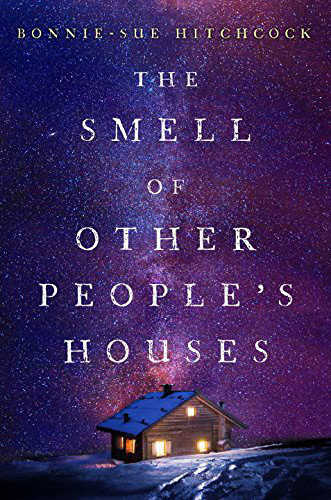Ranking: 5 Moose
There’s a line in “The Smell of Other People’s Houses” in which one of the characters says “We don’t have to be blood to be family.” Then, toward the end of Bonnie-Sue Hitchcock’s profoundly wistful novel, the line is repeated again – and not just for effect. Hitchcock leaves no doubt in the readers’ mind whatsoever – her splendid, little novel is homage to the strength, resiliency and majesty of the family, regardless of the biology.
Hitchcock begins her story simply. Ruth, one of her main characters, sets up her predicament by letting us know that her father, a fisherman turned political activist, was killed in a plane crash, coming home from a lobbying effort in Washington D.C. Her mother crumbled and Ruth and her little sister went to live with their grandmother, a life now enmeshed by poverty.
Next up is Dora, another young girl, whose mother wastes her time away at the Sno-Glow, “every single day” getting sloshed, dreading the day her abusive husband will return home, once released from prison. On her heels is Alyce, who tells us of her dreams to be a ballet dancer, if only she can find the time away from her father’s fishing boat to rehearse.
Finally, we meet Hank, the oldest of three brothers, surrogate father to the younger two, who wears his mantle of responsibility like a heavy cloak, knowing that the only way to rescue his brothers from their entirely dysfunctional family is to flee, run away from home – and so he does, thrusting him and his siblings into an adventure they will not soon forget.
One by one, Hitchcock lets her young characters control each chapter, shedding light on their own particular struggles, as they meander their way through the morass of conflicts and contradictions which plague most young people who strive to figure out the best way to foster their own self-identity. It’s a much tougher go of it for her crew of misfits, who live on the periphery of those sacrosanct boundaries protecting the average teenager. What’s amiss or missing completely for our storytellers is the safety net of active, engaged parents. Either the parents are missing in action, too caught up in their own lives, dysfunctional or emotional cripples, or even worse, criminally dangerous.
With all this going for it, Hitchcock gets off to a bit of a rocky start. At first you wonder where the story is headed. The very brief chapters, all told in first person by the young people who populate Hitchcock’s universe, appear slightly disjointed. There’s some reference from one chapter to the next about previously mentioned kids, but it’s all tangential, tenuously bound together by snippets of conversation, oblique references. But then, while wondering when and if the momentum will shift, seamlessly, the pace quickens, her young people share more intimate revelations with you; she draws you in closer, causing you to take notice, sort of like when you became aware that your baby brother has sprouted two inches and his voice is in a different register.
Once the book gains its footing, it all quickly falls into place. The connections between the young ones and the adults snap into focus. Immediately, the ubiquitous tethers of family that inextricably link them all together illuminate before our eyes, like strands of Christmas tree lights. Brothers who ran away from a despondent mother and abusive step-father are befriended by a boat’s night watchman, shielding them from harm like a father would defend his brood. His actions speak to family in the very best sense of the word. When the tough-as-nails nun bursts out in tears while eavesdropping on the conversation between the unwed teen and the young couple vying to adopt her unborn child, her role as a sister expands beyond the habit she wears. And, in a ruefully charged scene, one of her emotionally battered kids says to a friend’s dad ‘“Can I stay with your family? Can I stay and never have to leave.”’ He responds … ‘“you don’t have to ask,”’ … then wraps her “in his huge arms,” finally giving her the father she’s sought for so long.
By her final pages, Hitchcock eloquently ties together all the loose ends: relationships between friends and families; incipient romances about to blossom; hurt feelings on the mend; hopes, those fragile vessels buoying us through the night, coming to fruition. We leave her book sadder, yet more fulfilled, knowing in our hearts that for all of us, somewhere, family is there.
• David Fox is a freelance writer who resides in Anchorage. Contact him at dfox@gci.com.

